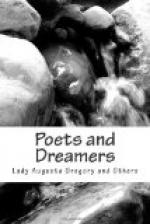The next is very simple, and puts into more homely words the feeling of ‘lonesomeness’ that is looked upon as almost the worst of evils by the Irish countryman, as we see by his proverb: ’It is better to be quarreling than to be lonesome.’ ‘I would be lonesome in it,’ is often the reason given for a refusal to go from bog or mountain cabin to some crowded place ‘where there is not heed for one or love.’
’Oh! if there were in
this world
Any
nice little place,
To be my own, my own for ever,
My
own only,
I would have great joy—great
ease—
Beyond
what I have,
Without a place in the world
where I can say:
“This
is my own.”
It’s a pity for a man
to know,
And
it’s a pain,
That there is no place in
the world
Where
there is heed for him or love;
That there is not in the world
for him
A
heart or a hand
To give help to him
To
the mering of the next world.
’It is hard and it is
bitter,
And
a sharp grief,
It is woe and it is pity,
To
be by oneself.
It is nothing the way you
are,
To
anyone at all.
It is nothing the way you
are,
To
yourself at last!’
I suppose the following may be called a political poem, from its elusive reference to Home Rule. I was not sure on the point myself; for I thought the wearer of the ‘blue cloak and birds’ feathers,’ must be a fine lady, perhaps laying enchantment on the fields. But I heard some one ask the Craoibhin who he meant, and his answer was: ’I suppose I was thinking of an aide-de-camp’:—
’I am looking at my
cows walking,
What are you that would put
me out of my luck?
Can I not walk, can I not
walk, can I not walk in my own fields?
’I will not always be
turned backwards.
If there is need to be humble
to you, great is my grief,
If I cannot walk, if I cannot
walk, if I cannot walk in my own fields.
’It’s little my
respect, and it’s little my desire,
For your blue cloak, and your
birds’ feathers.
Can I not walk, can I not
walk, can I not walk in my own fields?
’The day is coming as
it’s easy to see,
When there shall not be among
us the ugly like of you.
And each one shall be walking,
and each one shall be walking,
Wherever shall be his will
and his own desire.’
There are some love songs in the little volume. But their writer has had, in his beautiful translations of the ‘Love Songs of Connacht,’ to put such intensity of passion into English, that he must despair of putting any new wings to passion, or any new exaggeration into lovers’ words. In one of these Connacht songs, the lover says: ’Blacker is the sun when setting than your features, Mary!’ And she answers back: ‘Neither star nor




